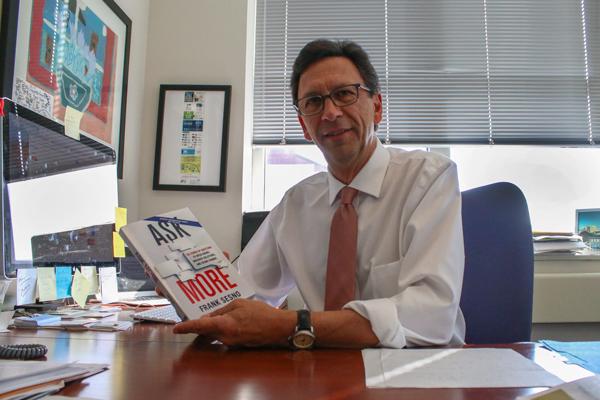
Frank Sesno, the director of the School of Media and Public Affairs, will publish a book about interviewing in January. Sesno said he will include the book in the class he teaches on the same topic.
Asking the right questions could get easier – if you buy the right book.
School of Media and Public Affairs Director Frank Sesno will release a new book about interviews in January, two years after he went on sabbatical to work on the project. Sesno is revamping his “Art of the Interview” course to include interviewing techniques from the book.
The book, titled “Ask More: The Power of Questions to Open Doors, Uncover Solutions, and Spark Change,” will be available for purchase on Jan. 10 and will be distributed by AMACOM Books, which specializes in management books.
Sesno’s work and upcoming course will explore how framing the right questions can drive subjects to give more precise and informative answers, which will help journalism students in their future careers, he said.
“Coming off this election campaign it is clear that the country, our politicians and our media should all need to take stock. We need to learn to ask more and assert less,” Sesno said. “Questions, asked strategically and repeatedly, framed around outcomes and accompanied by deep listening, lead to discovery, creativity, accountability, shared mission and a sense of purpose.”
The book will center on 11 types of questioning, including confrontational questions to hold an interviewee accountable, diagnostic questions to analyze problems and their solutions and empathy questions to evoke more personal answers, according to the book’s description.
“I hope the book demonstrates that questions give expression to and elevate creativity, citizenship and curiosity,” Sesno said.
The book will include interviews with CNN anchor Anderson Cooper, former Supreme Court justice Sandra Day O’Connor, former Secretary of State Colin Powell and NPR anchor Diane Rehm, Sesno said.
Sesno also used stories from his own career, including his interviews with the former chairman of the Palestine Liberation Organization Yasser Arafat and former House Minority Leader Nancy Pelosi. He also included personal interviews, like one with the doctor who diagnosed his mother’s cancer, he said.
Sesno, an Emmy award-winning journalist, spent 21 years at CNN as a White House correspondent, an anchor and the Washington bureau chief before coming to SMPA.
The book had been scheduled for release in 2016 but was pushed back to accommodate Sesno’s schedule and to give him extra time to maximize impact when it was released, he said.
Sesno will use his book to teach his “Art of the Interview” course next semester, and he said he will invite interviewees from the book to speak to the class. It was teaching the same course in spring 2013 that inspired him to write the book, he said.
“It was my students’ discovery in the class that convinced me there was a book to be written here,” Sesno said. “In the class this coming spring, students will examine different types of inquiry to understand the distinct forms of interview, preparation, question framing, listening and follow-ups that make for the most informative and productive exchanges.”
CNN anchor Wolf Blitzer wrote the book’s foreword and said the impact of Sesno’s work could be “enormous.”
“Frank Sesno had written a terrific book on the importance of asking the right questions at the right time,” Blitzer said.
Blitzer added that the skills Sesno highlights in the book are important for anyone who conducts interviews – not only journalists.
“I highly recommend this book for journalism students, working journalists and indeed professionals in all sorts of fields who need to ask the right questions,” Blitzer said.
Janet Steele, an associate professor of media and public affairs and international affairs, said that although she has not yet read Sesno’s book, she expects it to be meaningful for students.
“As with everything else that Frank does, he is certain to bring enormous energy, talent and real-world experience to both the book and the course it has inspired,” Steele said.
Steele added that all scholars in SMPA aim to make their research unique, even if their work is not as widely publicized.
“It is important to note that our less glamorous and more academic colleagues do exactly the same thing. It is our research and writing that drive the engine of good teaching,” Steele said.
David Karpf, an associate professor of media and public affairs and the director of graduate studies, said Sesno’s book and the reworked class should help make SMPA students better journalists.
“The class is going to teach critical journalistic skills and give our students the opportunity to learn the art of asking great questions from one of the very best question-askers of all time,” Karpf said.








